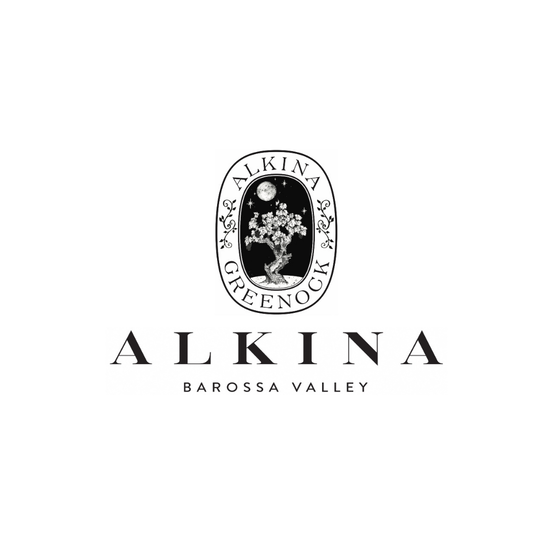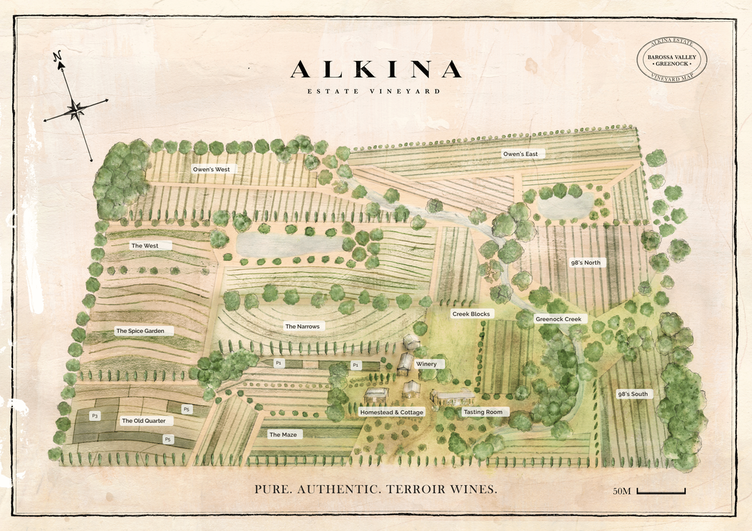Alkina Wine Estate
Barossa Valley, South Australia
Winemakers: Amilia Nolan
Alkina was established in 2015 when Argentinian vintner Alejandro Bulgheroni purchased a 60 hectare farm near Greenock in the North Western corner of the Barossa Valley.
With 70 year old vines and 170 year old stone buildings in need of repair, Amelia Nolan was tasked with bringing new life to the old bones of the farm. With the guidance of acclaimed winemaker Alberto Antonini, terroir expert Pedro Parra and a strong local team, Alkina is now a magical place with terroir winegrowing and regenerative farming at its heart.
Alkina is a new story on an old place. The certified organic and biodynamic farm sits on the traditional lands of the Ngadjuri people and they seek to honour the land’s Indigenous history and to learn from their deep connection to country. They have 43 hectares of vines planted to Grenache, Shiraz, Mataro and Semillon, with the oldest vines dating from the 1950s.
2023 Kin Semillon
2023 Kin Grenache Rosé
2023 Kin Grenache
2023 Kin Shiraz
With 70 year old vines and 170 year old stone buildings in need of repair, Amelia Nolan was tasked with bringing new life to the old bones of the farm. With the guidance of acclaimed winemaker Alberto Antonini, terroir expert Pedro Parra and a strong local team, Alkina is now a magical place with terroir winegrowing and regenerative farming at its heart.
Alkina is a new story on an old place. The certified organic and biodynamic farm sits on the traditional lands of the Ngadjuri people and they seek to honour the land’s Indigenous history and to learn from their deep connection to country. They have 43 hectares of vines planted to Grenache, Shiraz, Mataro and Semillon, with the oldest vines dating from the 1950s.
2023 Kin Semillon
2023 Kin Grenache Rosé
2023 Kin Grenache
2023 Kin Shiraz
2022 Striato Shiraz LIMITED
New name: Striato (formerly known as ‘Spice Garden’) refers to striations, or long narrow abrasions on rock, created by the movement of a glacier. It reminds us of the 600+ million year old geological history of this land.
Winery: P1 and P10 were picked on the 15th and 19th of March. Both components were fermented in concrete as 80% (P10) and 50% (P1) whole bunches before pressing back to concrete for maturation. Components remained separate until blending in October and bottling in December 2022.
2023 Birdsong Shiraz
Vineyard: Shiraz on clay and schist give depth and definition to make up the base of this wine with 36% from our young block 23 and 28% from Block 5+6, planted in the 1950s. Shiraz from block 38 on sandstone (31%) and P11 on schist and limestone (5%) add juiciness and fragrant lift. Fruit was picked between the 21st and 26th of March. NASAA certified organic and biodynamic.
Winery: Shiraz from block 23 came in as exceptional quality, despite the difficult season. It was fermented in two parcels as 70% and 100% whole bunch in concrete and stainless steel and pressed after 3 weeks on skins. Fruit from old vine Block 5+6 was fermented as 60% whole bunches also in concrete. Both block 23 and 5+6 were pressed once dry and matured in concrete. The remaining components, Block 38 and 26a were co-fermented in stainless steel as 30% whole bunches, while polygon 11 stayed as 100% whole bunch and was fermented in concrete. Both parcels were pressed and matured in large format oak. Components were racked and blended in spring prior to bottling.
New name: Striato (formerly known as ‘Spice Garden’) refers to striations, or long narrow abrasions on rock, created by the movement of a glacier. It reminds us of the 600+ million year old geological history of this land.
Winery: P1 and P10 were picked on the 15th and 19th of March. Both components were fermented in concrete as 80% (P10) and 50% (P1) whole bunches before pressing back to concrete for maturation. Components remained separate until blending in October and bottling in December 2022.
2023 Birdsong Shiraz
Vineyard: Shiraz on clay and schist give depth and definition to make up the base of this wine with 36% from our young block 23 and 28% from Block 5+6, planted in the 1950s. Shiraz from block 38 on sandstone (31%) and P11 on schist and limestone (5%) add juiciness and fragrant lift. Fruit was picked between the 21st and 26th of March. NASAA certified organic and biodynamic.
Winery: Shiraz from block 23 came in as exceptional quality, despite the difficult season. It was fermented in two parcels as 70% and 100% whole bunch in concrete and stainless steel and pressed after 3 weeks on skins. Fruit from old vine Block 5+6 was fermented as 60% whole bunches also in concrete. Both block 23 and 5+6 were pressed once dry and matured in concrete. The remaining components, Block 38 and 26a were co-fermented in stainless steel as 30% whole bunches, while polygon 11 stayed as 100% whole bunch and was fermented in concrete. Both parcels were pressed and matured in large format oak. Components were racked and blended in spring prior to bottling.
2022 Old Quarter GSM ~ LIMITED
60% Grenache, 35% Shiraz & 5% Mataro
Winery: The Grenache parcels were hand picked and sorted, then naturally fermented separately in concrete tulips with 100%whole bunches for Polygon No. 4 and 70% for Polygon No. 2. They both then matured in concrete for 9 months. The Mataro was de-stemmed, fermented and matured in concrete and the Shiraz fermented with 50% whole bunches in concrete. In January 2023 the 4 elements were blended and put back in a tulip until bottling.
60% Grenache, 35% Shiraz & 5% Mataro
Winery: The Grenache parcels were hand picked and sorted, then naturally fermented separately in concrete tulips with 100%whole bunches for Polygon No. 4 and 70% for Polygon No. 2. They both then matured in concrete for 9 months. The Mataro was de-stemmed, fermented and matured in concrete and the Shiraz fermented with 50% whole bunches in concrete. In January 2023 the 4 elements were blended and put back in a tulip until bottling.
There are three polygons that have, since the very early days, looked like they could stand apart as Single Polygon wines.
Polygon 3 is 0.274 hectares (ha) and approximately 200 vines. Its soil profile is shallow red brown earth over deep chalky, sedimentary limestone which contains fractured schist and limited iron.
Polygon 5 comprises two similar parcels of 0.12ha and 0.25ha, a total of 0.37ha. These Polygon 5 sections have deeper soils and well fractured schist with ferric clay (within the fractures).
Polygon 1 was defined in Pedro’s second visit in 2018. The block is 0.4ha which Pedro divided into separate areas and recommended that we exclude one section of 0.097ha which lacks the fractured schist of the other sections.
Alkina says ‘These 22 Polygons are something else….Tight and a bit backward upon opening, they unfurl slowly in the glass and will have epic and long lives ahead of them. P3 and P5 picked on the same day; 70% whole bunch each, all winemaking the same – quite different wines, but both elegant, with finesse and layers. Amelia called P3 a wine with “lots of tiny moments”, which is a description we love.’
2022 Alkina Polygon 1
2022 Alkina Polygon 3
2018 Alkina Polygon 5
Polygon 3 is 0.274 hectares (ha) and approximately 200 vines. Its soil profile is shallow red brown earth over deep chalky, sedimentary limestone which contains fractured schist and limited iron.
Polygon 5 comprises two similar parcels of 0.12ha and 0.25ha, a total of 0.37ha. These Polygon 5 sections have deeper soils and well fractured schist with ferric clay (within the fractures).
Polygon 1 was defined in Pedro’s second visit in 2018. The block is 0.4ha which Pedro divided into separate areas and recommended that we exclude one section of 0.097ha which lacks the fractured schist of the other sections.
Alkina says ‘These 22 Polygons are something else….Tight and a bit backward upon opening, they unfurl slowly in the glass and will have epic and long lives ahead of them. P3 and P5 picked on the same day; 70% whole bunch each, all winemaking the same – quite different wines, but both elegant, with finesse and layers. Amelia called P3 a wine with “lots of tiny moments”, which is a description we love.’
2022 Alkina Polygon 1
2022 Alkina Polygon 3
2018 Alkina Polygon 5











